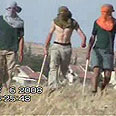

B'Tselem: Jewish West Bank settlers grab more land
Human rights group issues report saying settlements grabbed land, some of it privately owned by Palestinians, by fencing it off or by intimidation, calls on settlers to 'return to Israel'. Yesha Council: If B'Tselem's demands heeded, it will be easier to murder Jews
Jewish settlers in the occupied West Bank have annexed tens of thousands of acres of land, some of it privately owned by Palestinians, an Israeli human rights group said on Thursday.
A report issued by Israel's B'Tselem human rights organization said some settlements had grabbed land up to two and a half times greater than their own designated area either by fencing it off or by intimidation.
It said settlers should return to Israel.
Israeli government officials were initially not available to comment on the report but a spokesman for Jewish West Bank settlers said the land annexation was an authorized security measure.
"It must be clear to B'Tselem that if their demands are heeded, it will be easier to murder Jews," Yesha Council spokesman Yishai Hollander said.
Palestinians say settlement building denies them land they want for a contiguous state and a US-backed peace "road map" calls on Israel to halt all settlement activity in the West Bank.
In a summary of the 58-page report, B'Tselem said two main means were used to secure land.
"Settlers, and sometimes members of Israel's security forces violently attack and harass Palestinians who venture near settlements, erecting fences and other physical and electronic devices around the land, blocking Palestinian access."
B'Tselem said it could only give a rough estimate of the land in question, as in most cases there was no official sanction or documentation.
However, the report gave more specific details for 12 settlements which lie east of a barrier which Israel has built in the West Bank, a project Israel calls a security necessity and Palestinians describe as a land grab.
It described Israel's unofficial annexation of 4,558 dunams (1,126 acres) of land around the 12 settlements as part of a plan called the Special Security Area plan which has more than doubled the area under the settlers' control.
It said half this land was privately owned by Palestinians.
"The closing of lands around settlements primarily harms Palestinian farmers, who face almost impassable bureaucratic obstacles when attempting to access their lands. As a result, many are forced to stop cultivating," B'Tselem said.
'Settlers beat us, shoot at us'
It added that in many cases the Israeli authorities turn a blind eye to "unlicensed" closure of land and that they systemically avoid enforcing the law on "criminal settlers."
The report further brings accounts by Palestinian farmers and shepherds, who claim they were assaulted by settlement trying to ward them off the land.
The Palestinians said the in many cases, IDF soldiers took part in the violent acts: "The often join the settlers and actively take part in running them (Palestinians) off. We've seen soldiers do exactly what settlers tell them, as if they were under their command," said the report.
Khalil Halayla, of the Palestinian village of al-Samoa, near the West Bank city of Hebron, is one of 10 Palestinians banned from their lands. He told Ynet that he has provided the authorities with proprietary documentation many time, but to no avail: "We've been chasing the Israelis for more than two years now, and nothing. There is no other place in the world where a person is banned from his land like this."
Those able to work their land, he added, do not necessarily fare better, since they are plagued by repeated assaults at the hand of the settlers, who "beat us, shoot at us and try to drive us away, usually with the help of police officers and soldiers. When we file a compliant with the Kiryat Arba Police, nothing is done about it."
In many cases, he said, police refuse to lodge the complaints, and later claim they were never filed.
About 70,000 settlers live east of the barrier made up of both high concrete wall and chain-link security fence that extends for a total of 405 km (252 miles), much of it snaking through the West Bank.
This week, Israeli Vice Premier Haim Ramon presented a compensation plan to buy out settlers who agree to leave homes located beyond the barrier, before implementing any peace deal with the Palestinians.
Israel has said it intends to continue to build in settlement blocs it wants to keep in any future peace deal.















